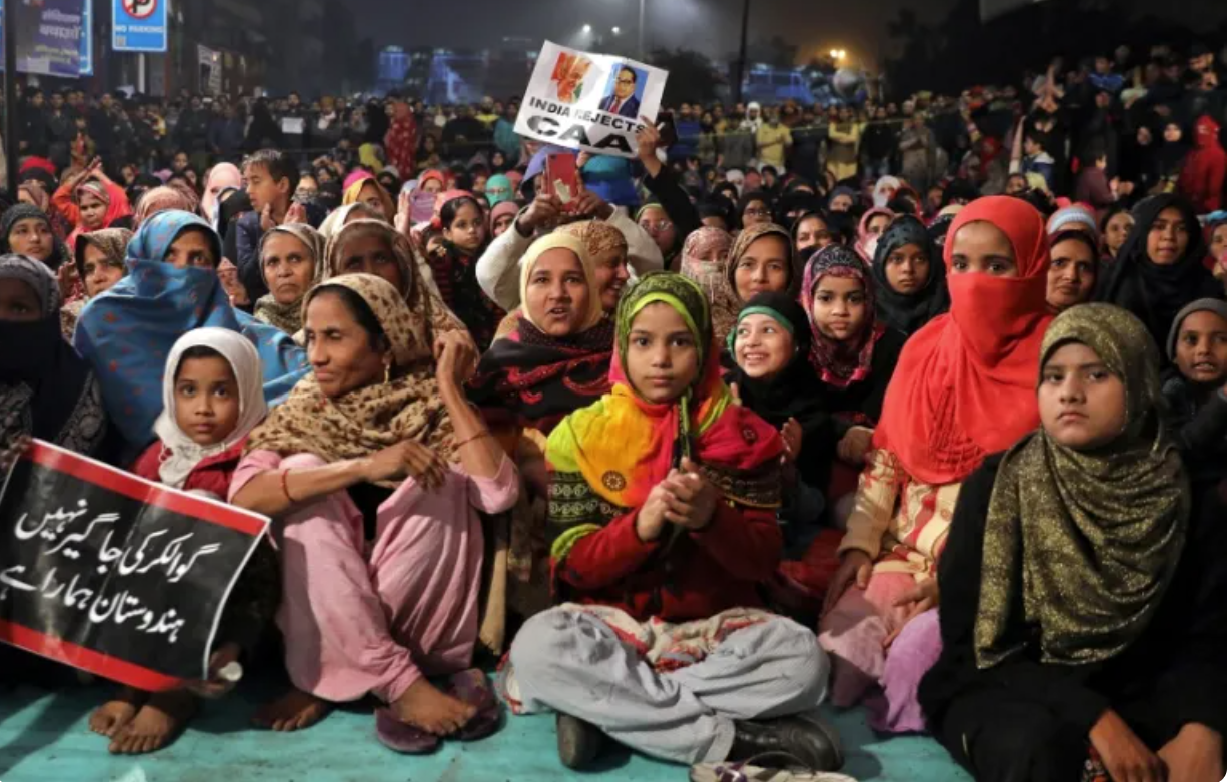Shaheen Bagh’s Bright Legacy Lives On
In December 2019, a small group of Muslim women in South Delhi gathered on a cold night to protest the newly passed Citizenship Amendment Act (CAA). The law, combined with proposals for a nationwide citizenship registry, raised widespread fears that Indian Muslims could be excluded and rendered stateless. What began with a few women sitting on a broken bench soon grew into Shaheen Bagh—a months-long, women-led, round-the-clock sit-in that became the heartbeat of resistance to discriminatory citizenship laws.
Shaheen Bagh created something India had rarely seen before: a public square where Muslim women—grandmothers, students, home-makers, teachers—sat shoulder to shoulder, reclaiming citizenship, dignity, and visibility. The site inspired similar protests across the country and reshaped how young urban Muslims saw themselves. Even after the protest ended in early 2020, its spirit carried into community organizing, art, education, and trauma-healing efforts, especially in the aftermath of the Delhi riots.
Miles2Smile
One of the most powerful examples of this continuing legacy is Miles2Smile, an organization built by Shaheen Bagh organizer Aasif Mujtaba, which now runs schools and healing centers for children and families affected by violence.
Below is a Q&A that explains the movement, the moment, and the ongoing impact.
What exactly was Shaheen Bagh?
Shaheen Bagh was a peaceful, continuous sit-in protest led primarily by Muslim women. Beginning on December 15, 2019, it lasted for over 100 days. Protesters gathered daily—through winter nights, rain, and police pressure—to oppose the Citizenship Amendment Act (CAA) and proposed citizenship policies seen as discriminatory.
It became a symbol of moral courage, democratic assertion, and the refusal to be erased.
Why did people protest the CAA/NRC/NPR in 2019–20?
Together, these policies threatened to make citizenship dependent on paperwork many marginalized communities do not have. While the CAA offered protections to non-Muslim migrants, it excluded Muslims—raising the fear that a nationwide citizenship check (NRC/NPR) could target Muslims for exclusion.
Shaheen Bagh represented a collective stand against this discriminatory framework.
How did Shaheen Bagh change the public sphere?
protests in 2019
Shaheen Bagh made Muslim women visible in a political landscape that often obscured or stereotyped them. Students, artists, poets, farmers, and faith leaders visited the site; solidarity protests spread nationwide.
Most importantly, it gave young Muslims the confidence to speak openly about their stories, fears, and hopes.
How does this legacy connect to the work happening today?
One powerful continuation is Miles2Smile, a relief and rehabilitation organization founded by Shaheen Bagh organizer Aasif Mujtaba. Inspired by the women who held the protest together, he expanded his work after the 2020 Delhi riots—building schools, learning centers, trauma-healing programs, and vocational training hubs for communities deeply affected by violence.
Why is Miles2Smile significant?
Because it shows that protest can grow into long-term community care.
In places like Sunrise Public School in Loni—serving nearly 800 children—education, safety, and stability are rebuilding futures disrupted by violence. The organization’s programs offer trauma counseling, art therapy, literacy classes, and skill development through initiatives like Hunar Academy.
Is there a story that captures this transformation?
One example is Ahmed Rizvi, who lost both his parents in the 2020 violence. Withdrawn and traumatized, he slowly found healing through art therapy at a Miles2Smile center. Today, he’s thriving academically and socially—and talks about the organization as giving him “a new family.”
His journey reflects the resilience that Shaheen Bagh ignited.
Why does Shaheen Bagh still matter?
Because it transformed fear into courage, and courage into community.
Because it showed that ordinary women could reshape the nation’s conversation.
And because the work that continues today—in classrooms, community centers, and healing spaces—carries forward the belief that every life deserves dignity and safety.
Shaheen Bagh began as a protest.
Its legacy endures as a movement of care, confidence, and rebuilding.
READ MORE: https://frontline.thehindu.com/news/muslim-civil-society-post-shaheen-bagh-india/article70266276.ece



